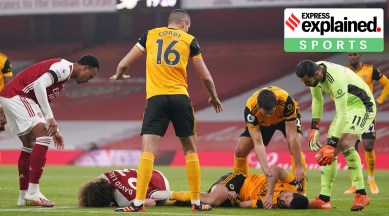Explained: Why is football considering concussion substitutes?
Arsenal defender David Luiz and Wolverhampton Wanderers forward Raul Jimenez collided during a Premier League game last Sunday, resulting in both suffering head injuries. The incident has prompted calls for a rethink on how football deals with such incidents.

A sickening clash of heads between Arsenal defender David Luiz and Wolverhampton Wanderers forward Raul Jimenez – with the latter needing surgery after a fractured skull – has prompted calls for a rethink on how football deals with such incidents.
What happened?
What is the current concussion rule?
The current Fifa protocols state that medical professionals on the field must look out for mandatory concussion symptoms like “clear or suspected central nervous system (brain) impairment, a potential cervical spine injury or skull fracture”. In 2018, Fifa came up with three concussion-related rules. The first stated that play could be stopped for up to three minutes to assess if a player was concussed. The second rule aimed to give team physicians power over the player or team management in deciding whether a player could continue on the pitch. And the third allowed a second team physician to have video access to the injury so as to make an off-the-pitch decision.
Why don’t existing guidelines work?
Luke Griggs, deputy chief executive of Headway, an organisation that helps people rebuild their lives after a brain injury and has been vocal in its campaign about football’s concussion protocols, said one of the reasons the current protocols aren’t effective is the pressure physios are put under.
“Concussion is notoriously difficult to diagnose due to its often-hidden symptoms that can be delayed in their presentation. The challenge for physios and team doctors is exacerbated by the lack of time currently afforded to them in football, and the fact that assessments are conducted on the pitch under the glare of players, coaches, managers and, in normal circumstances, thousands of fans,” Griggs told The Indian Express.
“Concussion assessments involve speaking with players to ask them how they’re feeling and assess their cognitive functioning. When you also factor in language barriers, the noise of the crowd, and the lack of time available to assess players, it is easy to appreciate the challenge physios face.”
What is the new rule being considered?
The new concussion rules currently being mulled would allow a team to make a permanent substitution in case of a concussion as diagnosed by the team physio, according to a report in The Guardian.
But this comes with a risk since the prospect of a permanent substitution may make players and team management reluctant to be completely honest about their symptoms.
“Temporary concussion substitutions provide the opportunity for medical teams to assess players in an appropriate off-pitch environment. If the International Football Association Board (IFAB) decides to only allow for ‘permanent substitutions’, which can of course still happen after a temporary substitution has taken place to allow for an assessment, the question would be how medical teams would make a decision about whether or not a player should be removed?” said Griggs.
Is football behind in its concussion-related rules?
Very simply put, yes. Cricket has introduced ‘like-for-like’ substitutes, with the discretion of the match referee. Batsmen are supposed to wear neck guards but they are yet to be made mandatory. In other sports like rugby, the ‘If in doubt, take them out’ philosophy is adhered to.
The NFL introduced a concussion protocol in 2009 that they continue to tweak as and when new studies emerge. Under the Madden rule, if, after an examination on the sidelines, the player is suspected to be concussed, he is to be taken to the locker room for further inspection. If at the end of the inspection, the player seems to not show any symptoms, they may be allowed to return to the field of play but will be monitored. However, if physios detect concussion, players aren’t allowed to return to the field that day.
Don’t miss from Explained | How a device that can take the weight of two elephants saved Romain Grosjean’s life
Are other forms of brain-related issues associated with football?
Studies have correlated concussions to dementia with a University of California San Francisco (UCSF) study showing that concussion almost doubles the chances of dementia in senior citizens. England and Manchester United legend Bobby Charlton has been diagnosed with dementia and heading in football has come under the scanner because of recent events. A study conducted by the University of Glasgow showed that former professional footballers had an approximately three-and-a-half times higher rate of death due to neurodegenerative diseases. 📣 Follow Express Explained on Telegram